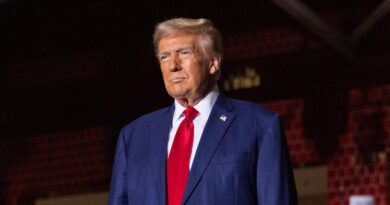Georgia Denies Trump Claim of Settling Election-Fraud Suit

U.S. President Donald Trump
Photographer: Ken Cedeno/Polaris/Bloomberg
Photographer: Ken Cedeno/Polaris/Bloomberg
President Donald Trump’s explanation on Thursday for why he’s dropping a Hail Mary lawsuit to reverse his election loss in Georgia is false, the state’s Republican attorney general said.
The president told a federal judge he’s voluntarily dismissing the suit seeking to invalidate the election result because he reached an out-of-court settlement agreement to sit down with state officials and discuss data allegedly showing voter fraud. But no such deal exists, Georgia Attorney General Christopher Carr said in a filing responding to Trump.
Governor Brian Kemp and Secretary of State Brad Raffensperger, the defendants in Trump’s futile Dec. 31 lawsuit, “do not object to Trump’s voluntary dismissal,” Carr said in the filing in Atlanta. “Defendants do object to the false grounds articulated in the notice.”
Trump’s emergency motion to “de-certify” President-elect Joe Biden’s victory was already denied Tuesday by U.S. District Judge Mark Cohen, who ruled the president was requesting “an extraordinary and unprecedented remedy” without evidence of wrongdoing. Dozens of such lawsuits have failed across the country.
Viewed as ‘Frivolous’
Trump’s filing also came after Congress formally certified the election result, despite being interrupted for several hours on Wednesday by a mob of the president’s supporters that raided the U.S. Capitol.
Carr said in Thursday’s filing that Georgia had balked at repeated efforts by Trump to discuss a settlement because they viewed his claims as “frivolous” and believed the state would prevail. In an email exchange attached to the state’s filing, the attorney general rejected Trump’s framing of a letter from Carr’s office.
“The letter was not a settlement offer, as you characterize it,” Carr’s office said in the email to Trump’s lawyer, Kurt Hilbert. Hilbert went on to tell the judge that Trump had reached a settlement with the state anyway.
Carr also said Hilbert appears to have violated Georgia’s rules of professional conduct by initiating the now-infamous Jan. 2 phone call between the president and Raffensperger in which Trump pressured the official to “find” more votes and reverse the outcome. While Hilbert was on the call, Raffensperger’s lawyers from Carr’s office weren’t, according to the attorney general.
Read More: Trump Georgia Call Preceded by Fresh Suit Over Election Loss
Hilbert “neither notified litigation counsel for defendant Raffensperger nor sought nor obtained consent to conduct or participate in a conversation with defendant Raffensperger,” Carr said in the filing. “This action by plaintiff’s counsel was undertaken despite the fact that the substance of the call concerned not only this action but also two pending state superior court matters and a pending appeal in the Georgia Supreme Court.”
Kemp and Raffensperger are also embroiled in state court lawsuits with Trump, including one that’s on appeal and another that’s set for trial Friday.
“We are confident that we have a valid settlement agreement,” Hilbert said in an email. “If you have doubts, we recommend that you speak with an independent contract attorney who we believe would corroborate our interpretation.”
As for Carr’s suggestion that he may have violated the code of conduct, Hilbert said he “was informed that the secretary of state was represented by counsel on the line and that I needed to get on the call,” adding, “I did not initiate the call.”
(Updates with comment from Trump lawyer in second section.)
*** This article has been archived for your research. The original version from Bloomberg can be found here ***


